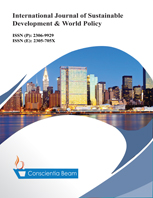Compost Adoption in Northern Ghana
Abstract
Despite describing a decline in soil fertility, Northern Ghanaian smallholders have not universally adopted use of organic, sustainable soil amendments such as compost. Farmers’ decisions about whether to use compost depend on their need and ability to do so. The agroecological context of a single rainfall season with low soil organic matter means that farmers’ need to compost is a paramount factor determining their decision to do so. Rogers ‘diffusion’ model of innovation adoption, that emphasizes the role of communication, is therefore relevant. However, farmers’ ability to transport compost is constrained by a lack of financial capital, meaning there is little opportunity for the participatory extension approach that places similar importance upon need and communication.

